“Verification” is a process of confirming the originating status of goods that
have already been imported under preferential tariff treatment of FTA.
Customs conducts verification of origin in accordance with the provision of each
FTA and Customs-related laws and regulations.
In order to benefit from the preferential tariff under an FTA, the imported good
must qualify as originating in accordance with the applicable rules of origin
of the FTA. Through verification, Customs ensures the proper application of
preferential tariff treatment under FTA.
As for the verification with the importer, Customs sends a written request for
information on the originating status of the imported good(s).
Customs determines whether the good qualifies as originating on the basis of
the information and documents provided by the importer.
If the originating status of the good is not confirmed through the verification
with the importer, Customs may carry out verification with the exporter or producer.
Customs sends a written request for information to the exporter or producer, or
conducts a verification visit to the premises (e.g. factories or offices) of the
exporter or producer.
If Customs cannot confirm the originating status of the good through the above
process, preferential tariff treatment would be denied.
Furthermore, depending on the cases, the good may be subject to an additional
tax/penalties for underpayment of Customs duties.
Here is the findings of the survey analyzed Origin Verification trend, based on
questioning WCO Member Customs administrations.
Table of Contents
Documentary examination
109 Customs administrations that responded to the question on the cases
where a documentary examination is undertaken at the import clearance,
the documentary examination is undertaken on the following basis:
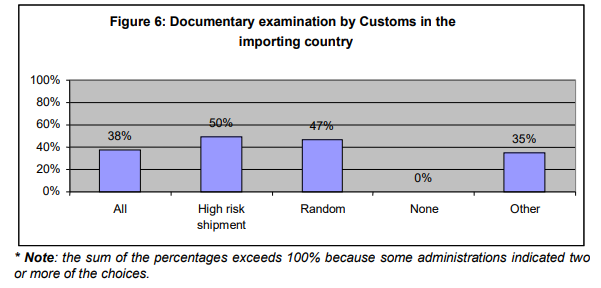
■All, 41 (38%);
■High risk shipment, 54 (50%);
■Random, 51 (47%);
■None, 0 (0%);
■Other, 38 (35%)
Points to be checked at the documentary examination
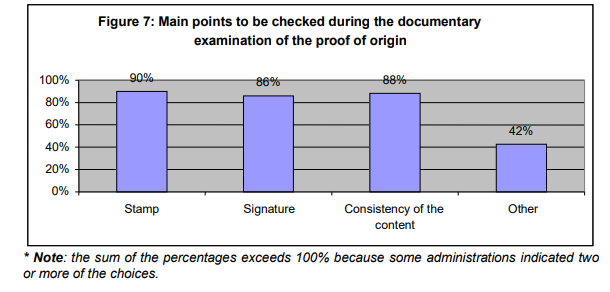
■Stamp, 98 (90%);
■Signature, 94 (86%);
■Consistency of the content, 96 (88%);
■Other, 46 (42%).
Motives for verification
109 Customs administrations that responded to the question on the main
reasons to conduct verification, doubt in the authenticity and doubt in the accuracy of the
content of the proof of origin were both common reasons for carrying out verification.
The result of the survey is as follows:
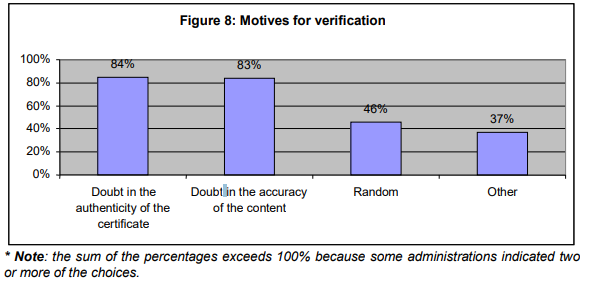
■Doubt in the authenticity of the certificate, 92 (84%);
■Doubt in the accuracy of the content, 91 (83%);
■Random, 50 (46%);
■Other, 46 (37%).
Verification channels
109 Customs administrations that responded to the question on the addressee of
the verification request, the verification through the competent authorities in the
exporting country was the most commonly accepted channel. The competent authorities
include Customs, chambers of commerce, trade/industry ministries, other authorized
bodies, etc.
Among the choices provided in the survey, the Customs in the exporting country was the
mostly chosen channel for verification. The following is the result:
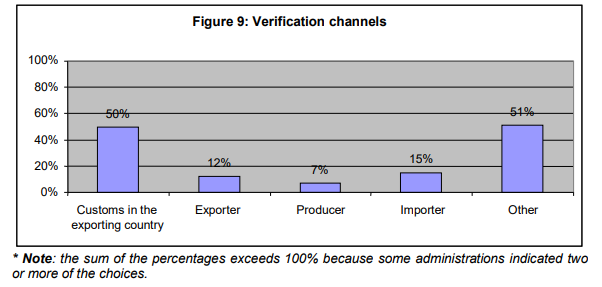
■Customs in the exporting country, 54 (50%);
■Exporter, 13 (12%);
■Producer, 8 (7%);
■Importer, 16, (15%);
■Other, 56 (51%).
Timing
109 Customs administrations that responded to the question regarding the
timing of verification, 44 (40%) indicated that they carry out verification only after the
release of goods. 43 (39%) indicated that they carry out either before or after release.
On the other hand, 22 (20%) indicated that they carry out only before release.
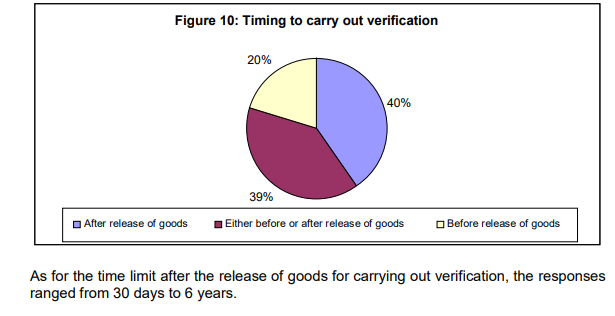
Verification visits
106 Customs administrations that responded to this question on whether
verification visits to the exporting country are conducted, 25 (24%) indicated that they do.
81 (76%) indicated that they do not.
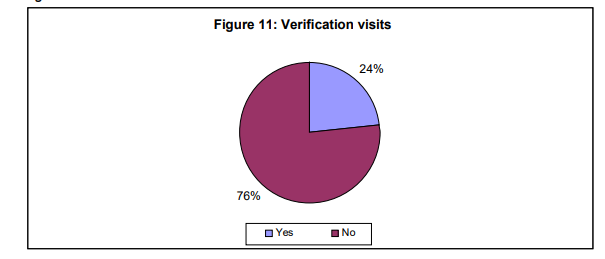
25 Customs administrations that replied ‘yes’ to the above question, 12 (48%)
indicated that they visit the premises of the exporter. 19 (79%) indicated that they visit
the producer.
* Note: the sum of the percentages exceeds 100% because some administrations indicated both
of the choices.
Information provision
The majority of the Customs administrations that responded provide origin information to
the requesting Customs or other authorities in the importing country. Out of the 108
Customs administrations that responded to this question, 97 (90%) indicated that they
do so. 11 (10%) indicated that they do not.
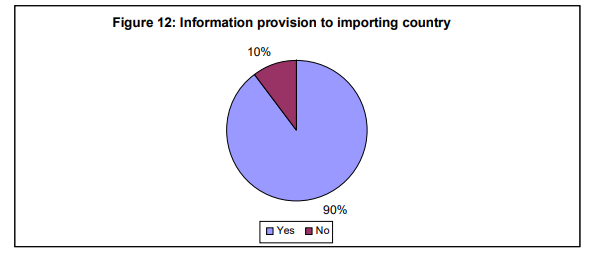
97 Customs administrations that replied ‘yes’, 81 (84%) indicated that the
preferential trade agreements were the basis for providing information. 67 (69%)
indicated that they would do so under the bilateral customs mutual assistance
agreements.
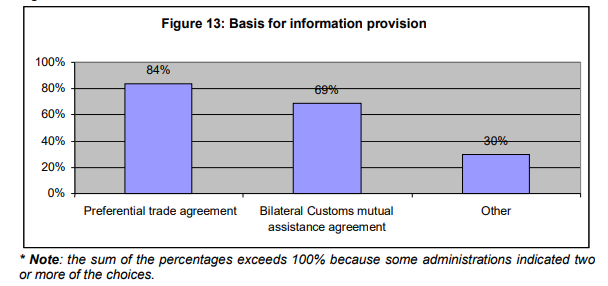
Number of Verification requests
94 Customs administrations that responded to the question on the number of
verification request, around 40% fell under the range over 100 per year. It would imply
that sending and receiving the verification requests are becoming one of the daily
businesses for many Customs administrations. The details are as follows:
<Number of verifications requests sent per year>
■None, 12 (12%);
■1 to 10, 20 (21%);
■11 to 100, 18 (19%);
■101 to 1000, 37 (38%);
■Over 1000, 3 (3%).
■No data / not disclosed, 7 (7%)
<Number of verifications requests received per year>
■None, 7 (7%);
■1 to 10, 24 (26%);
■11 to 100, 15 (16%);
■101 to 1000, 40 (43%);
■Over 1000, 1 (1%).
■No data / not disclosed, 7 (7%)
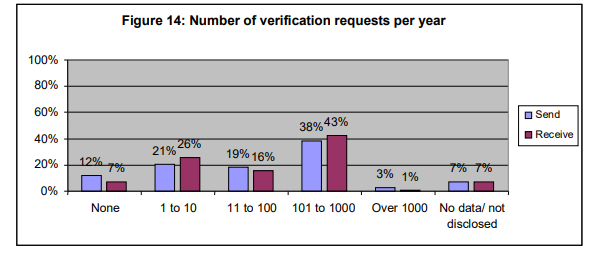
Provision of origin fraud information
75 Customs administrations that responded to the question, 63 (84%)
indicated that they would inform the exporting country if an origin fraud case were
identified. 12 (16%) indicated that they would not do so.
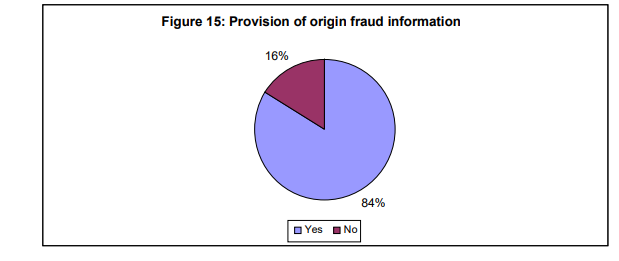
Retrieved from:World Trends in Preferential Origin Certification and Verification
